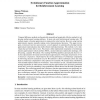976 search results - page 52 / 196 » Multimodal Optimization Using a Bi-Objective Evolutionary Al... |
127
click to vote
CORR
2010
Springer
15 years 2 months ago
2010
Springer
Temporal difference methods are theoretically grounded and empirically effective methods for addressing reinforcement learning problems. In most real-world reinforcement learning ...
171
click to vote
EMO
2009
Springer
15 years 8 months ago
2009
Springer
Abstract. The Vehicle Routing Problem with Time Windows is a complex combinatorial optimization problem which can be seen as a fusion of two well known sub-problems: the Travelling...
104
click to vote
GECCO
2007
Springer
15 years 8 months ago
2007
Springer
Modularity is thought to improve the evolvability of biological systems [18, 22]. Recent studies in the field of evolutionary computation show that the use of modularity improves...
122
click to vote
ICML
2003
IEEE
15 years 7 months ago
2003
IEEE
The links between genetic algorithms and population-based Markov Chain Monte Carlo (MCMC) methods are explored. Genetic algorithms (GAs) are well-known for their capability to opt...
107
click to vote
CEC
2003
IEEE
15 years 7 months ago
2003
IEEE
Neural networks and the Kriging method are compared for constructing £tness approximation models in evolutionary optimization algorithms. The two models are applied in an identica...


